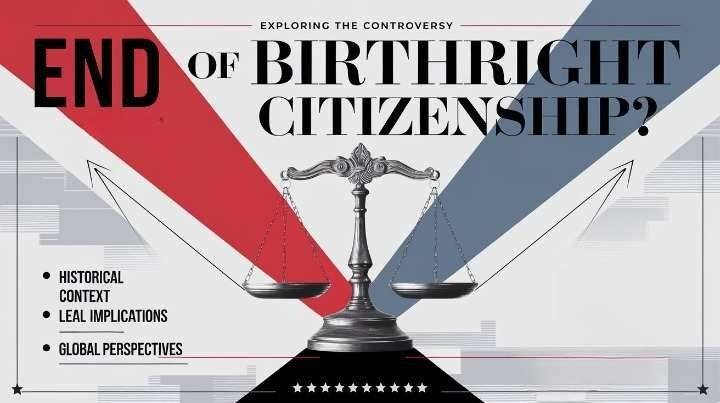If you were born on US soil, then you are an American citizen. It’s written into the Constitution. It was one of the necessary steps after that little spat called the Civil War. But this might not be the case for long.
The 14th Amendment and Its Historical Context
In 1868, Americans amended the Constitution to clarify that anyone born on US soil is automatically a US citizen. What Donald Trump presupposes is, maybe we didn’t. The once and future president has long promised to end birthright citizenship, most recently in an interview with NBC’s Kristen Welker. Trump claims that allowing automatic citizenship for children born on US soil is “ridiculous” and vows to end it.
The Wet Foot, Dry Foot Policy and Its Misapplication
Trump appears to confuse birthright citizenship with the wet foot, dry foot policy under the Cuban Adjustment Act of 1966. That law allowed Cuban refugees who made it to American shores to stay, but it has nothing to do with birthright citizenship. To clarify, let’s revisit the origins of birthright citizenship in the US.
Racism and the Three-Fifths Compromise
At its founding, the US legalized slavery, and the Constitutional Convention of 1787 led to the Three-Fifths Compromise, which counted enslaved people as three-fifths of a person for congressional representation. The infamous Dred Scott case further denied citizenship to Black Americans, but the Civil War and the 14th Amendment changed that.
The 14th Amendment and Citizenship
The 14th Amendment, ratified in 1868, explicitly states that all persons born or naturalized in the US are citizens. This amendment was designed to grant citizenship to formerly enslaved people and ensure equal protection under the law. However, its application has been contested, especially regarding children of immigrants.
The Wong Kim Ark Case: A Landmark Ruling
In 1898, the Supreme Court ruled in United States v. Wong Kim Ark that children born on US soil to non-citizen parents are US citizens. This case has been the cornerstone of birthright citizenship for over 125 years, reaffirmed in subsequent rulings like Plyler v. Doe in 1982.
Modern Challenges to Birthright Citizenship
Despite clear precedent, some conservatives, including Trump, argue that birthright citizenship should not apply to children of undocumented immigrants. Legal scholars like John Eastman have pushed this theory, claiming that the 14th Amendment was misinterpreted.
The Role of John Eastman and Conservative Opposition
John Eastman, a prominent conservative lawyer, has long opposed birthright citizenship. He gained notoriety for his role in the fake electors plot after the 2020 election and has argued that the 14th Amendment does not apply to children of undocumented immigrants.
Trump’s Plan to End Birthright Citizenship
Trump has vowed to sign an executive order on his first day in office to end birthright citizenship for children of undocumented immigrants. He claims this will deter illegal immigration and restore sovereignty, but legal experts argue this would violate the Constitution.
Texas’s Floating Barrier and the Invasion Argument
Texas has erected a floating barrier in the Rio Grande to deter migrants, claiming it is under “invasion” by undocumented immigrants. Governor Greg Abbott invoked the Actual Invasion Clause of the Constitution to justify state action, but courts have rejected this argument.
Judge James Ho and the Judicial Pushback
Judge James Ho of the Fifth Circuit Court of Appeals has suggested that undocumented immigrants could be considered an invading army, allowing states to bypass federal immigration laws. This theory aligns with Trump’s broader agenda to restrict birthright citizenship.
The Potential Impact of Trump’s Executive Order
If Trump issues an executive order to end birthright citizenship, it would likely face immediate legal challenges. Federal agencies might refuse to issue Social Security numbers or passports to children of undocumented immigrants, leading to a constitutional crisis.
The Supreme Court’s Role in the Debate
The Supreme Court would ultimately decide the fate of birthright citizenship. While precedent strongly supports the 14th Amendment’s guarantee, the current Court’s conservative majority could potentially reinterpret the law to align with Trump’s agenda.
Public Opinion and Media Coverage
Trump’s vow to end birthright citizenship has sparked widespread media coverage, with outlets on the left, right, and center framing the issue differently. While some emphasize the legal absurdity of Trump’s plan, others highlight its popularity among certain voters.
Final Thoughts: The Future of Birthright Citizenship
The debate over birthright citizenship reflects broader tensions over immigration and constitutional interpretation. While Trump’s plan faces significant legal hurdles, the outcome could reshape American citizenship and immigration policy for generations.

Leave a Reply